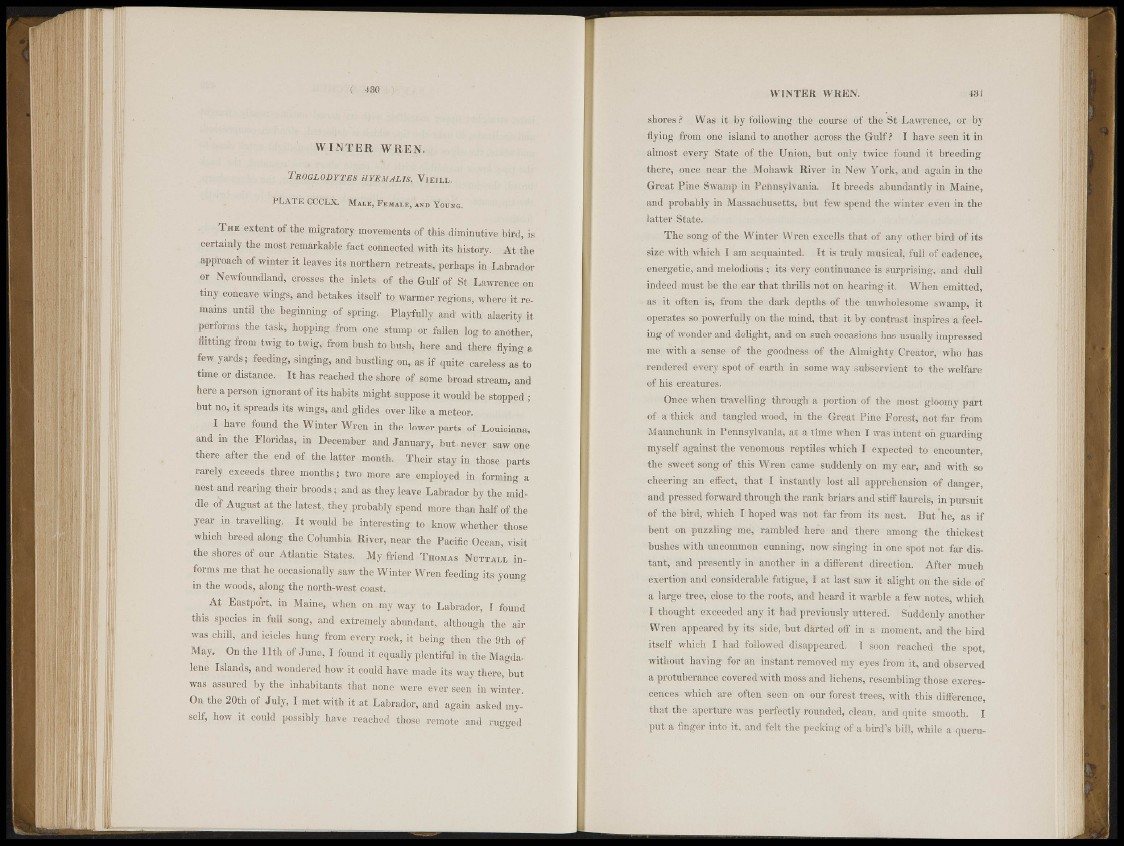
-430
W I N T E R WREN,
THOGI.ODYTKS m-KujLis. Vtkill.
The extent of the migratory movements of this diminutive bird, is
certainly the most remarkable fact connected with its history At,the
approach of wmter.it leaves its northern retreats-,, perhaps, in Labrador
or Newfoundland, crosses the inlets of the: Gulf of SfcLawrenbe 6»
%y concave wings, and betakes' its.elf to warmer regions, where tt remains
until the beginning, of spring Playfully and with alacrity it
perforins the task,- hopping from, one stump or fallen log to. ahêther,
flitting from twig to twig, from bush to bush, here and there flying a
few yifedsj feeding? singing* and bustling, on, apjfcf quite careless! ¡us to
time m distance« It has r,.ached the shore of some broad stream,-and
hure a person ignorant of its habits might suppose it ».ml,I be stopped ;
but no, it spreads its wings, and glides oyer like a meteor.
I hate found the Winter Wren in the lower parts of Louisiana,
and in the Florida*, in December and January, but-never saw one
there after the end of t-lu- latter, month. Their stay in those parts
rarely exceeds three months; two more are employed in forming, a
west and rearing their broods,; ami « tlu-.vJ(
W Labrador by the n.iddle^
August at the latest, they .probably spend more than half .of ft® .
year in travelling. It would be in.terestm.ir. to know whether those
which breed along the Columbia River, near the Pacific Ocean, visit
the; shores of our Atlantic States. My it-ion,1 Thomas \,:ti,vu. informs:
me that he occasionally saw the Winter Wren feeding its young
in the woods,, along the north-west coast.
At East-port, in .Maui,,, when on.rnv way to Labrador, I found
this species in full song, and extremely abundant, although the air
was chill, and icicles hung from every rock, it being then the 9th of
Mas On the 11th of June, I found it oqnally plentiful in the Magdala*
5 Islands, and wondered how it could have made its way there, but
was assured by the inhabitants that none were ever seen in winter.
On the 20th -of July, I met with it at Labrador, and again asked my- '
®#> h o w B: °®uld jWibly Jiave reached those remote and rugged -
WINTER WREN.
shores ? Was it by following the course of the St Lawrence, or by
flying from one island to another across the Gulf? I have seen it in
almost every State: óf the 'Union, but only twice found it breeding
there, once near the Mohawk River in New York, and again in the
Great Pine Swamp in Pennsylvania. It breeds abundantly in Maine,
and probably in Massachusetts, but few Spend the winter even in the
latter- State.
The song of the Winter Wren excells that of any other bird of its
size with- which I am acquainted: It is truly musical, full of cadentìe,
energetic, and melodious ; its very continuance is surprising, and dull
indeed: must be the ear that thrills .not on hearing-it. When emitted,
as it often is, from the dark depths of the unwholesome swamp, it
operates so powerfully ,on- the mind, that it by contrast inspires' a feeling
of wonder and delight, and on such occasions has usually impressed
me. with a sense of the: goodness, of the Almighty Greater, who has
romlrared every spot of earth in some way -subservient to the welfare
of bis creature*. :
Once when travelling through a portion of the most gloomy part
of a thick and tangled wood, in the Great Pine Forest, not far from
Maunchunk in Pennsylvania, at a time when I was intent on guarding
myself against the venomous reptile» which I expected to encounter,
the sweet song of this Wren cam« suddenly on my ear, and with so
cheering an effect, that I instantly lost all apprehension of danger,
and pressed forward through the rank briars and stiff laurels, in pursuit
of thè bird, which I hoped was not far from its nest. But "he, as if
bent on puzzling me, rambled here and there among the thickest
bushes with uncommon cunning, now singing" in one spot not. far distant,
and presently in another in a different direction. After much
exertion and considerable1 fatigue, I at last saw it alight on the side of
a large tree, close to the roots, and heard-it warble a few notes, which
I thought -exceeded any it had previously uttered. Suddenly another
Wren appeared by its side, but darted off in a-moment, and the bird
itself which I had followed disappeared. I soon reached the spot,
without having for an instant removed my eyes from it, and observed
a protuberance covered with moss and lichens, resembling those excrescences
which are often seen on our- forest trees, with this difference
that the aperture was perfectly rounded, clean, and quite smooth. I
put a finger into it. and felt the pecking of a bird's bill, while a queru